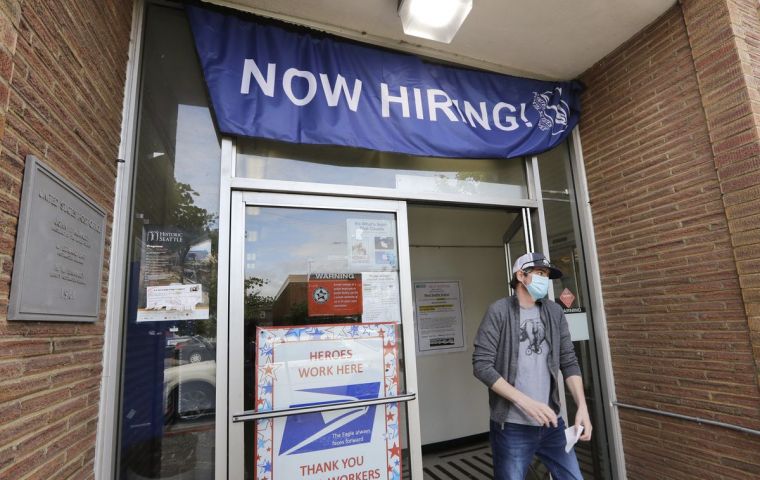MercoPress. South Atlantic News Agency
A fifth of US labor force received unemployment checks in the first week of June
 Initial claims for state unemployment benefits fell 60,000 to a seasonally adjusted 1.48 million for the week ended June 20, the Labor Department said
Initial claims for state unemployment benefits fell 60,000 to a seasonally adjusted 1.48 million for the week ended June 20, the Labor Department said The number of Americans filing claims for unemployment benefits fell moderately last week as the second wave of layoffs partially offset hiring by businesses reopening, suggesting the labor market could take years to recover from the COVID-19 pandemic.
Other data on Thursday reinforced expectations the economy would contract in the second quarter at its deepest pace since the Great Depression. Though orders for key capital goods rebounded in May, the increase recouped only a fraction of the prior declines. The goods trade deficit widened sharply last month as the respiratory illness disrupted trade further.
Initial claims for state unemployment benefits fell 60,000 to a seasonally adjusted 1.48 million for the week ended June 20, the Labor Department said. There was a jump in claims in
California, which together with Texas and Florida, has seen a surge in novel coronavirus cases.
Claims have dropped from a record 6.867 million in late March, but they remain more than double their peak during the 2007-2009 Great Recession. The report, the most timely data on the economy’s health, also showed 30.6 million people were receiving unemployment checks in the first week of June, about a fifth of the labor force.
Businesses in many states reopened more than a month ago after shuttering in mid-March to try to slow the spread of COVID-19. Companies are hiring, but others are cutting jobs at nearly the same pace.
The economy slipped into recession in February. From manufacturing to the transportation, retail and leisure and hospitality industries, companies are restructuring to adapt to a vastly changed landscape, leading to layoffs and bankruptcies.
A separate report from the Commerce Department showed orders for non-defense capital goods excluding aircraft, a proxy for business spending plans, increased 2.3% in May after dropping 6.5% in April. These so-called core capital goods orders are 5.6% below pre-pandemic levels.
The surge in coronavirus infections threatens the nascent improvement in business investment. Energy companies slammed the brakes on returning staff to their Houston offices as COVID-19 cases soared and top hospitals warned they could soon run out of beds for the most severely ill patients.
Another report from the Commerce Department said the goods trade deficit jumped 5.1% to $74.3 billion in May. Exports tumbled 5.8% while imports decreased 1.2%. With imports declining again, retailers and wholesalers drew down inventories.
Economists expect GDP could shrink at as much as a 46% annualized rate in the second quarter. The economy contracted at a 5% pace in the January-March quarter, the deepest downturn since the Great Recession.




Top Comments
Disclaimer & comment rulesCommenting for this story is now closed.
If you have a Facebook account, become a fan and comment on our Facebook Page!